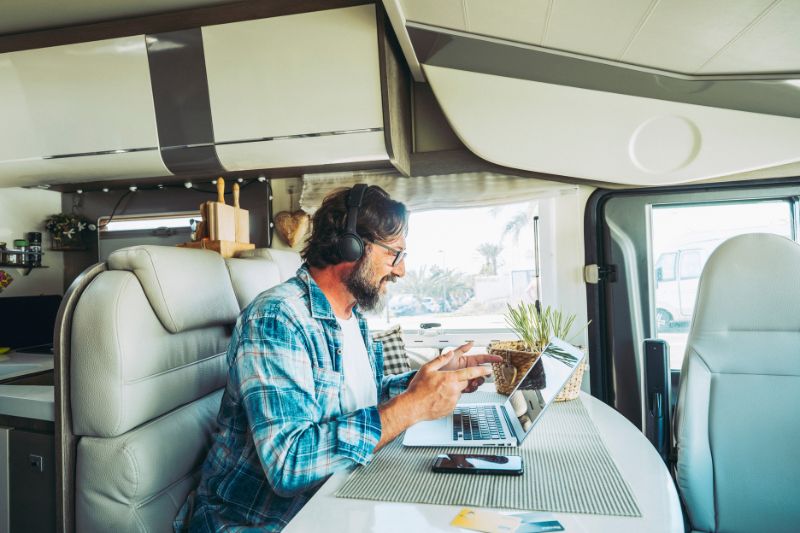Being digital nomadsAlthough in many cases it may seem like a luxury, for most of us it has become a necessity.
Those of us who had to leave our country behind, with our sights set on a different future and a different place, know what it means to start from scratch, with nothing but hope and a great desire to move forward.
Becoming digital nomad may seem like a distant or distant goal, but the reality is that it is not. With organisation, effort, and the right tools, we the Venezuelans we can also build a free, happy and above all, and what this post is about, working while we know the world.
In this article we want to take you step by step through the process of becoming one of the many digital nomads Venezuelans that they are already doing so.
What is being a digital nomad and why is it an opportunity?

To be digital nomad is to be able to work remotely, using a laptop and the internet, without being tied to a fixed location.
This allows us to moving from country to countryor simply to live where we feel better, with more opportunities and quality of life. For us, who have so often felt that the world is closing in on us, this is a way of escape and freedom.
Unlike other models migrantsthe digital nomads do not rely on traditional work permits or face-to-face employment.
Instead, they rely on online jobs They can work from anywhere, such as writing, programming, design, customer service, digital marketing, translation, language teaching, among many others.
What remote jobs can we look for?

Getting started may seem a bit overwhelming, but there are plenty of opportunities if you know where to look. Here are some ideas for remote works that are in high demand and that many Venezuelans are already doing so successfully:
- Content writing and copywriting: if we write well and can adapt to different styles, there are many platforms where you can hire copywriters in Spanish and English.
- Graphic design and UX/UI: if we handle tools such as Photoshop, Illustrator, Figma or Canva, we can offer creative services, although these are accompanied by technical studies.
- Programming and web development: This is one of the best paid fields. HTML, CSS, JavaScript, Python, among other languages, open many doors. They also require higher education.
- Virtual assistance: from managing emails to coordinating agendas. If you're organised, it's ideal.
- Remote customer service: many call centres work with freelancers in Latin countries.
- Online classes: if we speak English, we can teach Spanish or tutor other subjects on platforms such as Preply o Cambly.
- Digital marketing and social networks: community managers, video editors, content creators, advertising campaign analysts...
All this can be learned with free online courses. Platforms such as Coursera, Udemy, Domestika or even YouTube are our allies if we don't have the money to pay for vocational training.
Platforms to get jobs as digital nomads

Once we have decided what we want to do, the next step is to look for a job. Here are some platforms where we can start, even without experience:
- Upwork y Freelancer: ideal for freelancers with specific skills.
- Fiverr: good for offering small services, from logos to audio editing.
- Workana: focused on the Hispanic market, is widely used by Venezuelans.
- Remote OK y We Work Remotely: offers for remote 100% jobs with international companies.
- Toptal (more advanced): if we already have solid tech or design experience.
- Preply y Cambly: whether we want to teach languages or do tutoring.
- PeoplePerHour y Guru: alternatives to explore if we have already mastered major platforms.
The ideal is to create a good profile, with a portfolio and references. At the beginning it may be difficult to get the first clients, but with perseverance doors will open.
Which countries offer visas?

An increasing number of countries are creating special visas for digital nomadsunderstanding that these workers do not take away local jobs and contribute to the economy. For us, this is a great advantage if we meet the requirements.
Some countries accessible to us:
- Portugal: visa for remote workers with an income of at least €3,000 per month. Portugal also has a good Venezuelan community and a friendly climate.
- Spain: new visa for digital nomadswith minimum income requirement from €2,334 per month. The good thing is that we speak the language.
- Colombia: offers a visa for digital nomad from 2023. It is only necessary to prove a monthly income of approx. 900 USD.
- Mexico: Although it does not have a specific visa, it allows long stays with temporary residence or tourist with extension. Very accessible and culturally close.
- Georgia: allows stays of up to one year without the need for a visa for Venezuelans.
- Estonia and Croatia: also offer programmes for digital nomadsbut they ask for high income and well-organised documentation.
- Costa Rica and Panama: options in Latin America to live legally with remote jobs.
In each case, the updated requirements need to be verified, but the important thing is that there are real options, even coming from Venezuelaalthough it is always more interesting outside.
How to overcome documentation barriers?
One of the greatest difficulties we face as Venezuelans is access to documents in order and forms of receiving payments from abroad. But with a few tricks and patience, it can be solved.
Documentation:
- Valid passport: if it has expired, let's try to renew it as soon as possible in consulates or from the SAIME. Some countries allow entry with an expired passport for up to 5 years if we are Venezuelansbut for new visas a valid visa is required.
- Apostilles and translations: important if we are going to apply for visas. We can manage them online or with agencies in Venezuela.
- Proof of income or contracts: if we work freelancewe can use platforms such as Payoneer, Deel or TransferWise to display digital receipts and contracts.
Advice from experience

Start as digital nomad is not always easy, especially if you don't have the ideal resources from the start.
Many of us start with the bare minimum, without adequate equipment, a stable connection or a network of contacts. Still, with time, practice and support, useful tools and solutions can be found.
Some practical tips that can help:
- Look for a functional laptop, even if it is used. The important thing is to get started. There are also places that donate equipment.
- Share internet or use public Wi-Fi hotspots. It's not ideal, but it works as long as you get a better connection.
- Create a portfolio in Canva or Notion. You don't need a lot of experience. It is enough to show what we know how to do.
- Joining communities of Venezuelans such as the Venezuela Code. There we get contacts, advice and even opportunities, thanks to its application. Virtual Venezuela.
- Learn for free on the internet. YouTube, blogs, open courses. There is a lot of content.
We were afraid too. We also felt that we weren't enough, that we didn't speak perfect English, that no one would hire us. But we learned, we made mistakes, we tried again, and now here we are, earning in dollars, euros, pounds... from anywhere in the world.
Accessible destinations for digital nomads

We know that not everyone can afford a flight to Europe. But there are more affordable destinations to live in such as digital nomadsThe cost is low once there and the conditions are good:
- Portugal (Lisbon, Porto): one of the best and most affordable countries in Europe Western. Good quality of life, temperate climate and a visa for digital nomads. Many speak English and the Portuguese is easy to learn.
- Hungary (Budapest): vibrant city, stunning architecture and excellent internet. The cost of living is low for Western Europe and has a special visa for remote workers called the "White Card".
- Poland (Krakow, Warsaw): good infrastructure, growing tech community and reasonable prices. It's part of the EU, but cheaper than Western Europe. Many speak English.
- Czech Republic (Prague, Brno): high quality of life, cheap beer and good internet connection. Prague is a hub for startups and freelancers.
- Slovakia (Bratislava): less touristy than Prague but cheaper, safer and well connected with Austria and other neighbouring countries. Growing expatriate community.
- Latvia (Riga): one of the most interesting Baltic capitals, with modern coworkingsgood speed of internet and a moderate cost of living.
- Lithuania (Vilnius): very digital-friendly, with e-government initiatives. Very good internet and quiet environment to work in.
- Bosnia and Herzegovina (Sarajevo, Mostar): are very inexpensive, safe destinations with beautiful landscapes. They are still little inhabited and little known, but they are a very good option for those who are looking for tranquillity and a connection with nature.
- Croatia (Zagreb, Split, Dubrovnik): Croatia has long since released a visa for digital nomads. You can live near the sea Adriaticenjoy good weather and work from coworkings seafront.
- Estonia (Tallinn): one of the most digitised countries in the world. It has an official programme for digital nomads and facilitates electronic residency for freelancers.
- Greece (Athens, Thessaloniki, less touristic islands): attractive because of the climate, the history and the relaxed pace of life. Greece also offers a nomad visa and reasonable prices outside of touristy areas.
To be digital nomads being Venezuelans is not a fantasy. It is an ever-closer reality for many of us. It will not be easy, but it is possible.
With preparation, support and perseverance we can live by travelling, working at what we love, and building a new life, far from fear and scarcity.
At Curiara We know how hard it is to start again. We too have gone through sleepless nights, rejections, doubts. But we also know what it's like to cross borders, to find opportunities, and to reach out to those who come after us.
We are close to you. We are still here, giving you the best advice, because we know that you can do it too.
